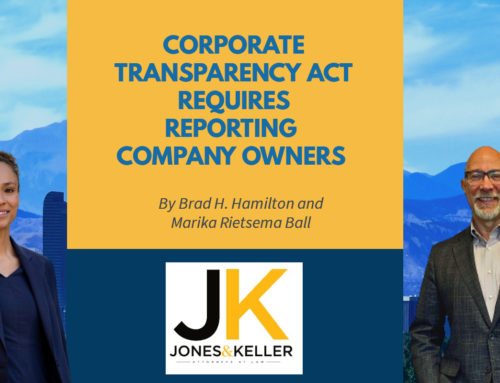April 27, 2020 by Brad H. Hamilton
Colorado Governor Polis recently summarized a phased economic reopening approach comprising a transition from “Stay at Home” to a “Safer at Home” policy, which will begin allowing businesses to reopen sometime in the week of April 27. Denver and other cities have vetoed that plan and openings will begin later in May. Although detailed guidelines have not yet been provided, in summary:
- Retailers will be able to open May 1 (later in May in many larger cities) if they follow strict social distancing policies, and safety measures.
- K-12, and higher education institutions will remain closed.
- Personal services like hair cutting salons will be able to open as long as they follow social distancing guidelines and wear masks.
- There will be a process for local governments to modify standards based on local conditions.
- When allowed, offices will begin opening at 50% capacity with strict safety precautions and checking temperatures.Phased in opening of restaurants may commence May 15 (or later, depending on your city).
- When allowed, offices will begin opening at 50% capacity with strict safety precautions and checking temperatures:
-
- Telecommuting is highly encouraged and expected to be maximized.
- Companies that need to have employees physically present will need to consider multiple shifts and other ways to limit contact among employees.
While opening dates for many businesses are not certain, it is clear that many businesses will begin opening in May and June. In addition to developing and implementing crucial physical distancing and other safety requirements specific to your business, businesses should also consider requiring customers to sign liability waivers.
Liability waivers are common in Colorado because of our culture of physical fitness and outdoor activity. We sign liability waivers when we go skiing and on any organized, guided, outdoor adventure like rafting or climbing, and those waivers are generally enforceable. Raup v. Vail Summit Resorts, Inc., 233 F. Supp. 3d 934 (D. Colo. 2017), aff’d, 734 F. App’x 543 (10th Cir. 2018).
Contractual waivers of liability are recognized under Colorado law, but are construed narrowly and “closely scrutinized” to make sure that the agreement was fairly entered into and that the intention of the parties is expressed in clear and unambiguous language. Jones v. Dressel, 623 P.2d 370, 376 (Colo. 1981).
Liability waivers are not favored by the courts, but If the language is clear, courts must implement the parties’ intent and understanding. 17A C.J.S. Contracts § 448. The wording must so clear and understandable that an ordinary person will know what is being contracted away – you must have the rights words!
The waiver should specifically reference COVID-19 and the contagious nature of COVID-19 and provide some information about person-to-person risk. It should describe possible methods of transfer (breath, physical contact, from contact with stable surfaces) and state the customer is voluntarily and knowingly assuming the risk of exposure to or infection by COVID-19 by using your services or premises, and that such exposure or infection may result in personal injury, illness, permanent disability, or death. The customer should also acknowledge that the risk of becoming exposed to or infected by COVID-19 may result from the actions, omissions, or negligence of the customer, or your employees and other customers.
A waiver is not a substitute for careful planning and implementation of safety procedures for your employees and customers. In fact, a waiver will only insulate you from liability for simple negligence, “and in no event will a release provide a shield against a claim for willful and wanton negligence.” Jones v. Dressel.
Nevertheless, a wavier may be a valuable tool to help prevent or reduce the risk of claims from customers alleging that your business or service made them sick.




